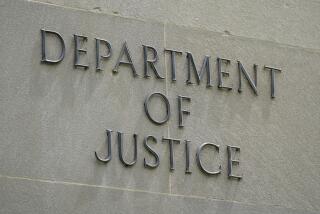Hong Kong Cable Bidding Is Upset : Group Including US West to Build World’s Biggest System
- Share via
A consortium that includes the American telephone company US West has scored an upset victory over Hutchison Cablevision in the competition to build Hong Kong’s cable television system, expected to be the world’s largest.
Hutchison, whose bid was led by Craig Ehrlich, formerly an executive with Los Angeles-based Falcon Cable TV, had been recommended by Arthur D. Little, the government’s independent consultant, and the Hong Kong Broadcast Commission.
But the government has been negotiating for several weeks with both Hutchison and the winning consortium, Hong Kong Cable Communications Ltd., despite the fact that the formal bidding was closed in February.
Hong Kong Cable is led by real estate and transportation magnate Y. K. Pao’s Wharf Holdings, which holds a 28% stake, and also includes Sun Hung Kai Properties (27%), US West (25%), Belgium’s Coditel cable TV company (10%) and Hong Kong-based Shaw Bros. (10%).
Political Wrangling
The group has pledged to invest $707 million in the project, and broadcasting is slated to begin in 1991. The company will also offer data communications services, and by 1995 it is expected begin offering a full range of telephone services.
Jack MacAllister, the chairman of US West, based in Englewood, Co., said in a statement: “This franchise, combined with our European activities, is further evidence that US West is becoming a major player in the international cable communications industry.”
The cable franchise award has been the subject of political wrangling in the British colony for more than two years. Hutchison, controlled by real estate tycoon Li Ka-shing, expected to be awarded the franchise in 1987, but the government decided to accept public bids instead.
Hutchison, in the recent negotiations, was unwilling to match Hong Kong Cable’s offer of guaranteed, sliding scale royalty payments to the government amounting to 7% to 8% of gross revenues, nor would it add $160 million to the $550 million it already had proposed to spend on the 1.8-million-subscriber system.
Ehrlich, managing director of Hutchison Cablevision, said in a telephone interview that “Mr. Li declined to continue the competition” because of the new conditions added by the government and because of uncertainties about the future of the colony (which reverts to Chinese sovereignty in 1997) in the wake of the suppression of the democracy movement in China.
The decision by Hutchison group not to push ahead was “bitterly disappointing,” Ehrlich added. “When you’ve committed that much time and money, you usually never worry about the shareholders backing out.” Hutchison spent about $4 million preparing the bid.
Another factor in the decision may have been the Hong Kong government’s reported nervousness about granting the business to Li because he already controls a substantial amount of local infrastructure, including the electric company and the container port. Some speculated that the government had deliberately driven Hutchison out of the bidding with new conditions.
More to Read
The biggest entertainment stories
Get our big stories about Hollywood, film, television, music, arts, culture and more right in your inbox as soon as they publish.
You may occasionally receive promotional content from the Los Angeles Times.








